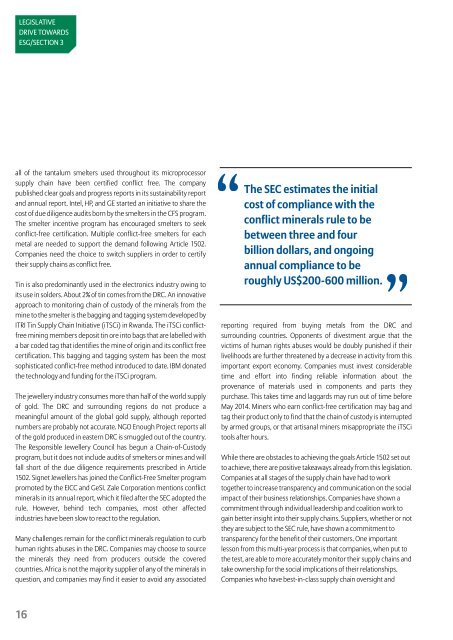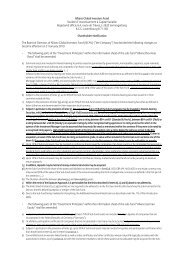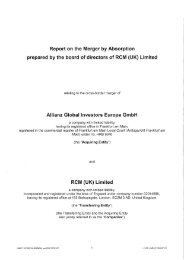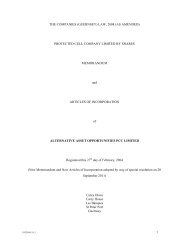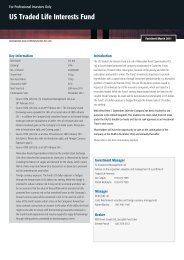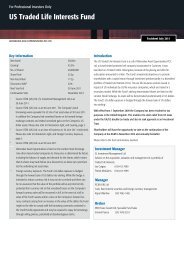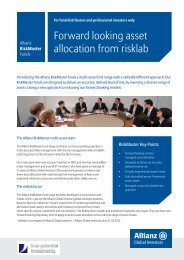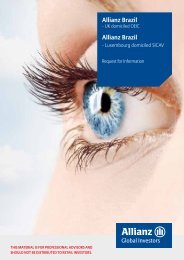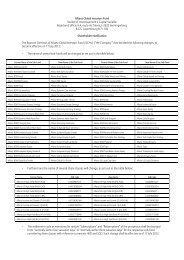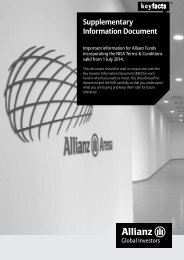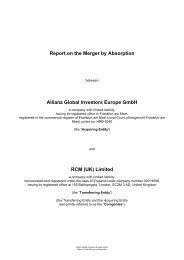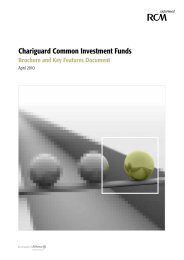ESG Matters, Issue 5, April 2013 - Allianz Global Investors
ESG Matters, Issue 5, April 2013 - Allianz Global Investors
ESG Matters, Issue 5, April 2013 - Allianz Global Investors
Create successful ePaper yourself
Turn your PDF publications into a flip-book with our unique Google optimized e-Paper software.
legislativedrive towardsesg/section 3all of the tantalum smelters used throughout its microprocessorsupply chain have been certified conflict free. The companypublished clear goals and progress reports in its sustainability reportand annual report. Intel, HP, and GE started an initiative to share thecost of due diligence audits born by the smelters in the CFS program.The smelter incentive program has encouraged smelters to seekconflict-free certification. Multiple conflict-free smelters for eachmetal are needed to support the demand following Article 1502.Companies need the choice to switch suppliers in order to certifytheir supply chains as conflict free.Tin is also predominantly used in the electronics industry owing toits use in solders. About 2% of tin comes from the DRC. An innovativeapproach to monitoring chain of custody of the minerals from themine to the smelter is the bagging and tagging system developed byITRI Tin Supply Chain Initiative (iTSCi) in Rwanda. The iTSCi conflictfreemining members deposit tin ore into bags that are labelled witha bar coded tag that identifies the mine of origin and its conflict freecertification. This bagging and tagging system has been the mostsophisticated conflict-free method introduced to date. IBM donatedthe technology and funding for the iTSCi program.The jewellery industry consumes more than half of the world supplyof gold. The DRC and surrounding regions do not produce ameaningful amount of the global gold supply, although reportednumbers are probably not accurate. NGO Enough Project reports allof the gold produced in eastern DRC is smuggled out of the country.The Responsible Jewellery Council has begun a Chain-of-Custodyprogram, but it does not include audits of smelters or mines and willfall short of the due diligence requirements prescribed in Article1502. Signet Jewellers has joined the Conflict-Free Smelter programpromoted by the EICC and GeSI. Zale Corporation mentions conflictminerals in its annual report, which it filed after the SEC adopted therule. However, behind tech companies, most other affectedindustries have been slow to react to the regulation.Many challenges remain for the conflict minerals regulation to curbhuman rights abuses in the DRC. Companies may choose to sourcethe minerals they need from producers outside the coveredcountries. Africa is not the majority supplier of any of the minerals inquestion, and companies may find it easier to avoid any associatedThe SEC estimates the initialcost of compliance with theconflict minerals rule to bebetween three and fourbillion dollars, and ongoingannual compliance to beroughly US$200-600 million.reporting required from buying metals from the DRC andsurrounding countries. Opponents of divestment argue that thevictims of human rights abuses would be doubly punished if theirlivelihoods are further threatened by a decrease in activity from thisimportant export economy. Companies must invest considerabletime and effort into finding reliable information about theprovenance of materials used in components and parts theypurchase. This takes time and laggards may run out of time beforeMay 2014. Miners who earn conflict-free certification may bag andtag their product only to find that the chain of custody is interruptedby armed groups, or that artisanal miners misappropriate the iTSCitools after hours.While there are obstacles to achieving the goals Article 1502 set outto achieve, there are positive takeaways already from this legislation.Companies at all stages of the supply chain have had to worktogether to increase transparency and communication on the socialimpact of their business relationships. Companies have shown acommitment through individual leadership and coalition work togain better insight into their supply chains. Suppliers, whether or notthey are subject to the SEC rule, have shown a commitment totransparency for the benefit of their customers. One importantlesson from this multi-year process is that companies, when put tothe test, are able to more accurately monitor their supply chains andtake ownership for the social implications of their relationships.Companies who have best-in-class supply chain oversight and16


